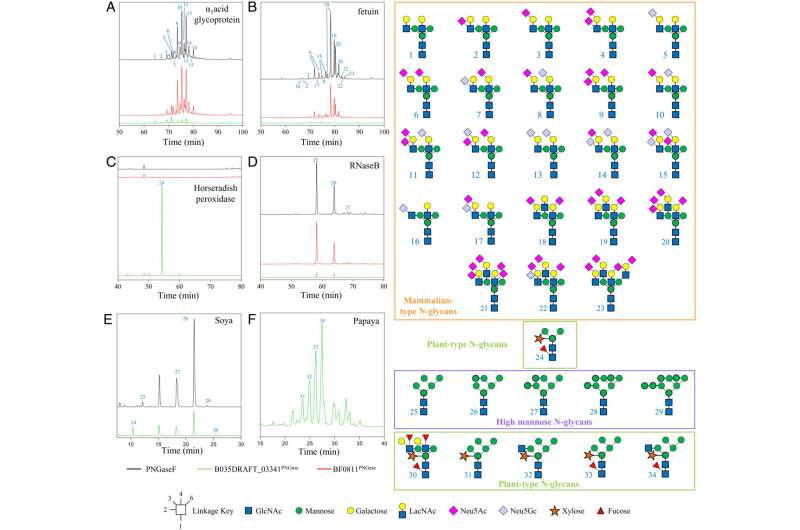Food for our guts: Human microbes feed on plant sugars

A carbohydrate commonly found attached to plant proteins is a food source for the bacteria in our gut, new research suggests.
A paper published in the Proceedings of the National Academy of Sciences describes how species of gut microbes use plant N-glycans, a type of complex carbohydrate, as nutrients. The research was led by researchers from the University of Birmingham and Newcastle University, who used genomic data to identify specific enzymes produced by gut bacteria to break down the complex carbohydrate structures.
Information about enzymes that are produced by the gut microbiome will enable researchers to better understand how to manage good gut health. These enzymes also have biotechnological applications, such as reducing allergenic responses to food and some medicines. As the plant sugars that the gut microbes feed on are associated with some allergies from pollen and plant-based foods, the authors suggest that the enzymes could be harnessed to make some foods and medicines less likely to have allergic reactions.
Dr. Lucy Crouch, lead author of the study from the Institute of Microbiology and Infection at the University of Birmingham said, "The gut microbiome is an incredibly important feature for human health, and this finding will enable us to better understand the microbiome. By identifying the particular enzymes that these microbes use to digest their food, we can consider how future diets can be developed that promote a healthy gut, and as a result improve our general health.
"One unexpected outcome from the study is that insect N-glycans are also targeted by the some of the enzymes discovered. In a future scenario where we increasingly rely on alternative protein sources such as insects, this work provide insights into how insect proteins may also provide nutrients for our gut microbes."
Dr. David Bolam, co-lead author of the study from Newcastle University said, "We are still learning the role our gut plays in our overall health and so learning how microbes in our gut are able to use plant N-glycans is vital. This has developed our knowledge both in terms of understanding how these sugars are broken down by the microbiota, but also to discover new enzymes that could be used to alter and analyze N-glycan structures for medical and industrial applications."
More information: Lucy I. Crouch et al, Plant N -glycan breakdown by human gut Bacteroides, Proceedings of the National Academy of Sciences (2022). DOI: 10.1073/pnas.2208168119
Journal information: Proceedings of the National Academy of Sciences
Provided by University of Birmingham





















